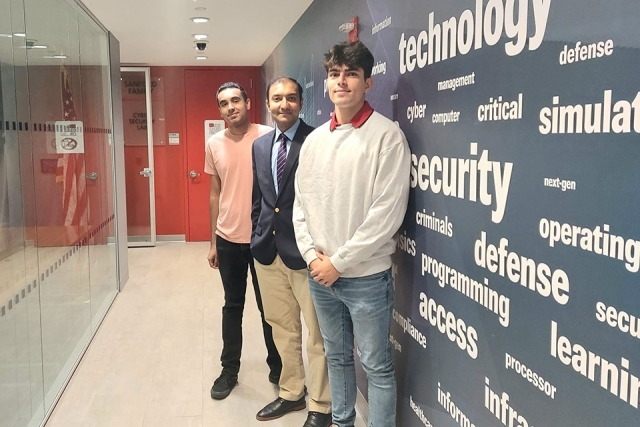
St. John’s University has been awarded a $550,000 grant from the US National Science Foundation to develop an artificial intelligence (AI) remedy to the time-consuming process of medical coding and health care billing.
Syed Ahmad Chan Bukhari, Ph.D., Associate Professor, Division of Computer Science, Mathematics, and Science, Director of Research, The Lesley H. and William L. Collins College of Professional Studies, will lead a team of five to six researchers who will use AI’s machine-learning capabilities to read doctor’s notes, identify symptoms that could lead to diagnosis, and, later, code the conditions for more efficient insurance filing.
The one-time grant will fund two years’ worth of research in an emerging area of technological development. According to Dr. Bukhari, the AI remedy would enable medical offices and clinics to focus more on patient care and less on billing and related concerns.
“Doctors are trained to treat diseases, and that is how they should spend their time treating patients,” Dr. Bukhari said. “But currently doctors are dealing with software issues and coding. Doctors are occupied with so many things they should not be.”
AI technologies have been used in the health-care industry for several years, most notably as a reminder tool for patients in need of tests, as a means of answering patient questions, and as a disease predictor. Dr. Bukhari and his team will attempt to automate the coding process, enabling offices to produce more precise diagnoses faster.
Presently, office personnel, called medical coders, translate information from doctors’ notes into standardized codes that are used for billing and record keeping. To do so, they must identify and extract the most relevant information, such as the primary reason for the visit and additional conditions treated.
Coders then use manuals or specialized software to identify and store the information. The potential for human error is always present and can have long-term implications, Dr. Bukhari said.
Coders work in every type of health-care facility and coding requires extraordinary attention to detail.
“Medical coding companies might have people on staff who work all day in other jobs,” Dr. Bukhari explained. “Then when they start their coding responsibilities, they have to read everything and write down all the proper codes.”
When properly configured, computers can help expedite the diagnosis and treatment of medical conditions. They also can help resolve prompt insurance reimbursement to medical centers. Computers and AI technology can offset the staffing shortages that have challenged the health-care industry, particularly in the aftermath of the COVID-19 pandemic.
In developing their AI platform, Dr. Bukhari’s team will seek input from medical professionals to optimize the system’s performance. Dr. Bukhari stressed the team is not seeking to replace medical coders; rather, they are hoping to create a machine-based process that could supplement human work, making the entire coding system more efficient.
“In the current process, a patient can have pathology going to one lab, medications going in another direction, and an MRI to another destination,” Dr. Bukhari explained. “So, for the purposes of reimbursement, it can be challenging. So, we thought, ‘how can we streamline the process and save time?’ ”
“We think this would transform the job of medical coder into that of fact-checker or auditor,” Dr. Bukhari added.
Luca Iandoli, Ph.D., Dean of the Collins College of Professional Studies and Professor, Division of Computer Science, Science, and Mathematics, said Dr. Bukhari’s research demonstrates an ideal application of AI technology.
“This grant is a well-deserved recognition of the quality and academic impact of Dr. Bukhari’s research,” Dean Iandoli said. “It is also a great example of bridging invention with market opportunities in the field of health-care administration in which advancement in AI can bring significant improvements for many stakeholders.”
Related News
Founder’s Week Celebration Lights Hearts on Fire at St. John’s
St. Vincent de Paul was a practical man of action. He was a master at building teams composed of the most talented people suited to his cause. His passion motivated others; he set hearts on fire.
New Academic Year Celebrated by Honoring and Welcoming Faculty
On the eve of each new academic year—before the bustle that naturally comes with new and returning students—St. John’s University always takes a moment to pause and reflect on the critical contributions made by its faculty, honoring their service and welcoming its newest members.
St. John’s Embraces the AI Frontier: Preparing Students for a Human-Centered Future
At St. John’s University, artificial intelligence (AI) isn’t just a trending topic—it’s fast becoming an integral part of how students learn, create, and prepare for the world ahead.
